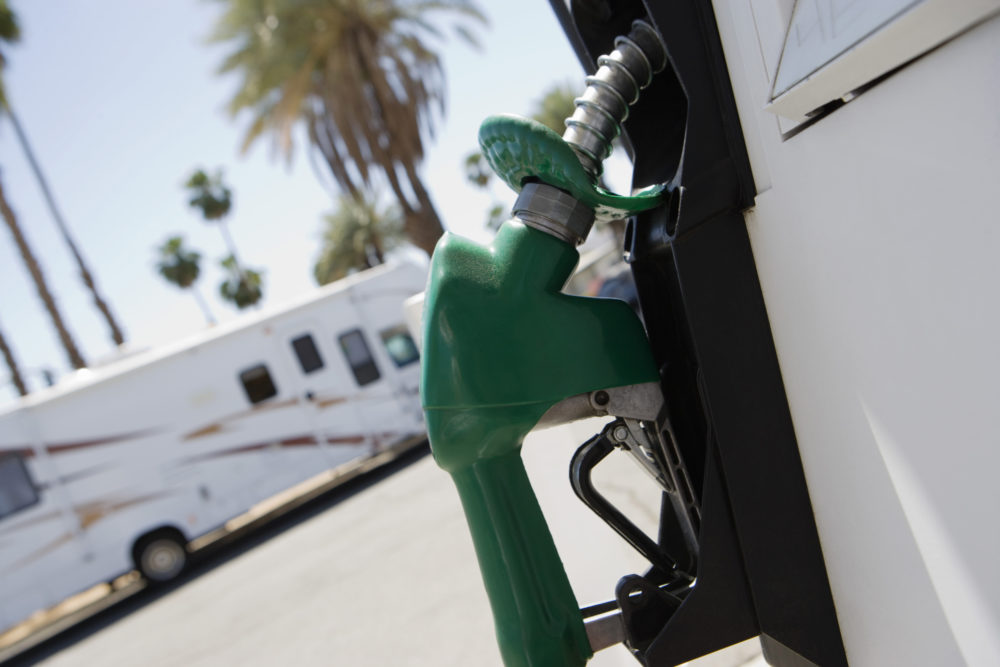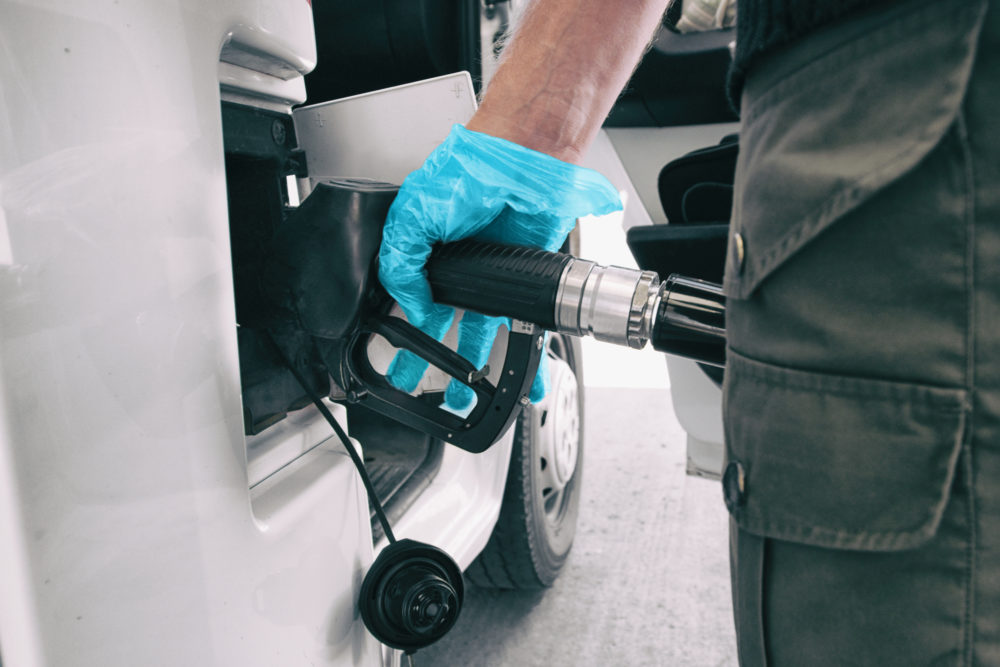Average RV gas tank size – Class A, B & C with examples
Below are the fuel tank size ranges on all drivable RVs:

Contents
A diesel pusher can hold anywhere from 80-150 gallons of fuel! That’s a big tank!
A Class A holds, on average, about 100 gallons of fuel, although some luxury models (e.g. Tiffin) can hold up to 150 gallons.
A Class B can hold up to 24 gallons of fuel, on average.
A Class C can hold between 25-50 gallons of fuel.
Diesel vs Gasoline and Average Fuel Tank Size
A diesel truck has a bigger fuel tank capacity than a gas vehicle. Since diesel fuel is thicker than gas, the tank holds appout 32 gallons of fuel.
In addition to that, the diesel has better fuel mileage, so that you can drive about 300 miles per tank when towing and 600 miles per tank without towing an RV.
A gas truck holds between 23-35 gallons
What are RV storage tanks?
RV storage tanks are different from gas/fuel tanks: the RV storage tanks are plastic bladder-like cavities that hold fresh water (meaning, potable water one can use for washing, flushing toilets and often, cooking), or gray and black water.
Gray water is the dirty wastewater from washing hands, showering or using in the kitchen sink area, while black water is the toilet waste (liquids, solids and the water that is used to flush both, along with any treatment chemicals).
The sizes of these tanks differ greatly based on the size of the RV and the occupancy capacity: some RVs only have a 4 gallon gray water tank while bigger RV’s can have two or three different large gray water tanks (designated for each living area).
Ways to optimize your mileage
There are several different ways one can optimize the fuel mileage of the RV, especially as the fuel prices are higher and easily the largest budget item of one’s travel expenses:
Maintain proper tire pressure
RV tires have to carry a heavy load. Under or overinflated tires can pose a serious risk and also lead to uneven wear down and bad fuel mileage. There are great Tire Pressure Monitoring Systems (TPMS) on the market that come with the newer RVs or can be easily installed and calibrated after-market.
You should always check and adjust the tire pressure before each trip and whenever there is a big change in temperature and/or elevation.
Drive at an efficient speed
Most RVs are rated to travel at 55-65 mph max speed, due to the tire rating and axle load/stress.
Setting your tow vehicle at cruise control at those speeds when on highways or interstates (whenever possible) will help keep the fuel mileage down, as you are not constantly accelerating/decelerating.
Avoid hauling cargo on the RV’s roof
When you add things onto the RV, you are not only adding extra weight to the unit, but you are also causing drag, changing the RVs aerodynamic flow during the travel.

How do I calculate my MPG?
Avoid unnecessary idle time
If you plan to stop at a rest stop to have lunch in the RV, don’t leave your engine running. Diesel engines are the exception here, because they do require a warm-up period and it is hard on them to turn them on and off frequently.
Gasoline engines
Gas engines are more affordable in terms of truck cost, maintenance and fuel cost these days. However, the towing mileage is not that stellar: on average, 8-10 mpg when towing, and 20-25 mpg when traveling.
A gas truck does not have the same towing power a diesel truck would have, so if you need to tow a heavy RV, make sure you do your due diligence in researching the appropriate tow vehicle size.
Diesel engines
As mentioned above, diesel engines must be pre-warmed up before you head out. You also need a diesel fuel supplement, DEF fluid, that you add separately to your truck as you travel.
Diesel engines get a much better fuel mileage than their gasoline counterparts, especially as tow vehicles: on average, 10-15 mpg when towing, and 25-30 mpg when traveling.
Reduce the weight the RV carries
You know the adage: “Travel light.” While it helps to have some weight in the RV to tow better and to avoid fishtailing, you need to make sure you distribute the weight evenly, with preference to front loading (especially when towing a fifth-wheel).
The more weight you haul, the harder your engine has to work. Keep in mind that there are max weight limits that your RV can carry and your truck can pull, as well. Consider everything that you pack into your RV: do you really need it?
Is there a lighter alternative (example: you don’t need a whole set of dishes and pans; you don’t need 20 towels-and turkish towels are lighter and more space-efficient that the bulky cotton ones).
FAQ:
How long does it take to fill up a black water tank?
Depending on the RV occupancy and daily use, a black tank can last up to 2 weeks between being emptied.
What is the typical RV holding tank size?
“A class A RV will hold the most water, averaging between 75-100 gallons. Class C RVs will hold 35-60 gallons, Class Bs will hold around 20-40, and fifth wheel trailers hold about 60-80 gallons. Smaller trailers hold 40-60 gallons.” (Source: camperreport.com.)
How do you know how full your tank is?
The newer RVs come with RV tank status sensors that display when the tank is full. Unfortunately, these sensors get clogged and malfunction very often. When your sinks and showers overflow, your gray tank is full. When your toilet drain flap makes a funny noise and there is smell, your black tank is also full and close to overflowing (something you want to avoid at all costs).
How long does a gray water tank last?
Depending on the occupancy and daily water use, a gray water tank could easily take 1 week to fill up. This means no long showers, though!
Where can I find RV tank sizes?
Prior to purchasing your RV, the RV tank sizes should be listed on the Website or brochure under the particular unit choice technical specifications. This information should also be in your RV owner manual. The dealership should be able to provide this info, as well, when given the make, model and year, along with the VIN.




